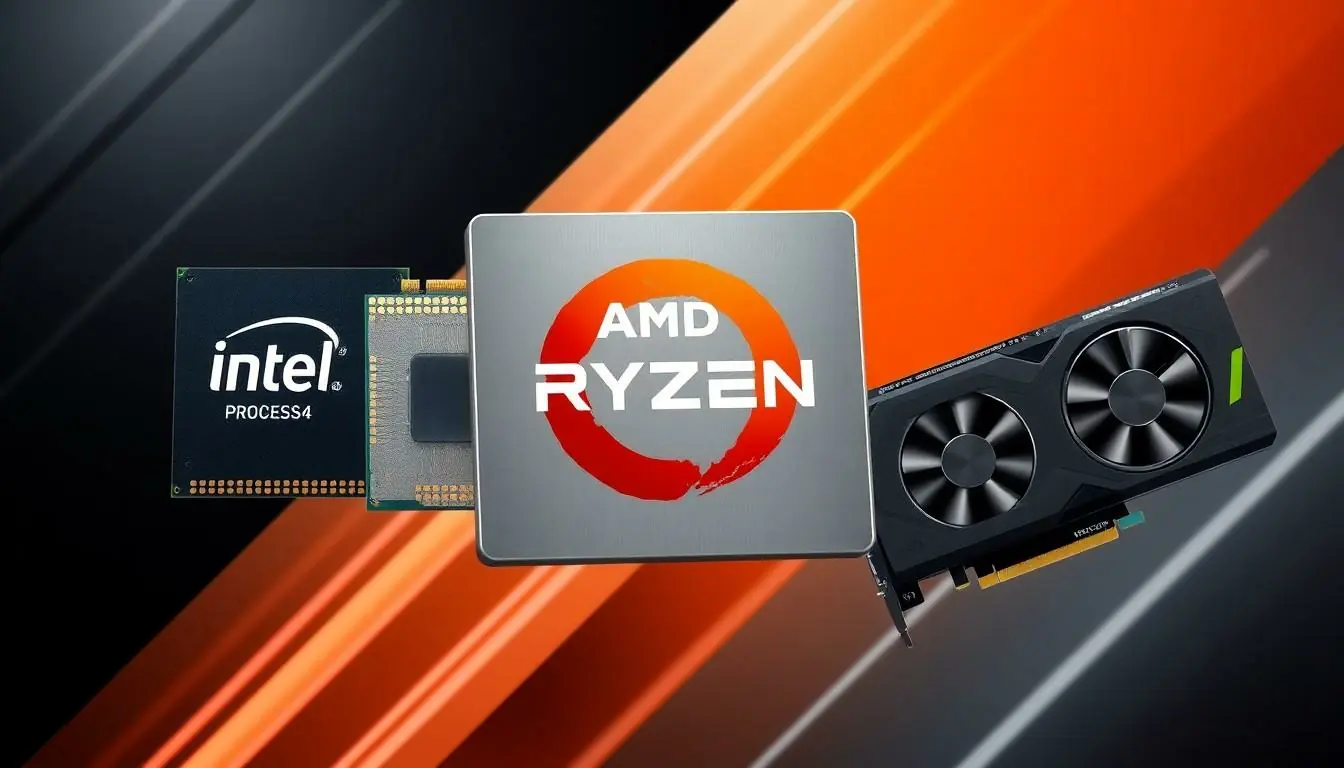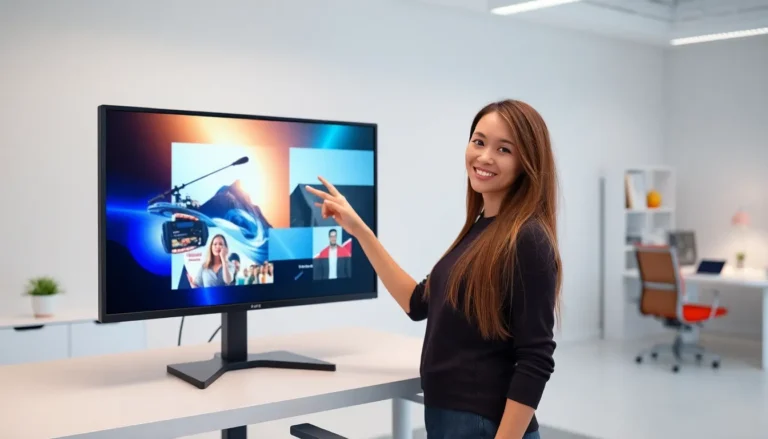Table of Contents
ToggleIn a world where computers are practically an extension of ourselves, the spotlight shines brightly on the unsung heroes behind the scenes: computer hardware companies. These tech wizards craft the components that power our devices, from the humble motherboard to the flashy graphics cards. Without them, our gaming marathons and binge-watching sessions would be nothing but a distant dream, leaving us staring at a blank screen.
Overview of Computer Hardware Companies
Computer hardware companies play a vital role in the technology landscape. They design and manufacture essential components that drive modern computing. Major players such as Intel, AMD, and NVIDIA focus on processors and graphics solutions while others, like Dell and HP, provide complete systems and peripherals.
These companies supply various hardware types, including motherboards, storage devices, and networking equipment. Motherboards, for instance, serve as the backbone for connecting all hardware components, enabling communication. Storage devices ensure data management through hard drives and solid-state drives, giving users reliable access to information.
Additionally, graphics cards enhance visual performance, essential for gaming, graphic design, and video editing. With the increasing demand for high-performance gaming systems, graphics hardware optimization has become critical. Companies like ASUS and MSI specialize in creating high-quality graphics cards tailored for diverse user needs.
Market growth has introduced a competitive landscape. Emerging companies focus on innovative technologies, contributing to advancements such as artificial intelligence and machine learning. A robust ecosystem of computer hardware companies fosters ongoing innovation, ensuring devices support evolving user demand.
Overall, computer hardware companies significantly influence the functionality and capacity of modern devices. By prioritizing performance and reliability, they ensure users enjoy seamless experiences in gaming, streaming, and everyday computing tasks.
Major Players in the Industry

Computer hardware companies drive technological advancement, providing critical components for various devices. Key players dominate the market and shape the future of computing.
Intel
Intel stands as a leader in semiconductor manufacturing, renowned for innovative microprocessors. The Core series processors service everyday computing tasks and high-performance applications. Numerous devices, from laptops to servers, utilize Intel’s technology, ensuring reliability and speed. They also focus on integrated graphics solutions, enhancing overall performance without requiring additional components. Additionally, Intel expands into areas like artificial intelligence and Internet of Things, seeking to broaden its market influence. Market share remains significant, establishing Intel as a front-runner in the hardware landscape.
AMD
AMD, short for Advanced Micro Devices, focuses on delivering powerful processors and graphics cards. Their Ryzen series processors offer competitive performance for gamers and professionals alike. Graphics cards under the Radeon brand enhance visual experiences across various applications. Significant advancements in multi-core technology propel AMD ahead in performance benchmarks. Recent collaborations reinforce their position in the high-performance computing sector. Users often appreciate AMD’s balance between power and efficiency, making it a preferred choice for many enthusiasts.
NVIDIA
NVIDIA excels in the graphics processing unit (GPU) segment, driving advancements in gaming, professional visualization, and AI. Their GeForce line of graphics cards remains popular among gamers for real-time rendering and immersive experiences. Additionally, NVIDIA’s innovations in ray tracing technology set new standards for visual fidelity in gaming. The company also invests heavily in AI-driven solutions, impacting industries like automotive and healthcare. Collaborations with major developers enhance gaming experiences, further solidifying NVIDIA’s stronghold in the market. Overall, the commitment to high-performance solutions keeps NVIDIA at the forefront of computer hardware.
Emerging Computer Hardware Companies
Emerging computer hardware companies are changing the industry landscape, driving innovation and competition. These organizations focus on unique solutions that cater to the evolving needs of users.
Startups to Watch
Startups like Valve and Framework have gained attention for their innovative approaches. Valve, widely known for gaming, entered hardware with the Steam Deck, a handheld gaming console that bridges PC gaming and portability. Framework promotes sustainability with its modular laptop design, allowing users to easily upgrade and repair components. Companies such as Supermicro are also making strides by offering customizable server solutions aimed at specific enterprise needs.
Innovative Technologies
Emerging firms often pioneer groundbreaking technologies that enhance performance. For instance, companies like Ampere Computing specialize in efficient processors designed for cloud computing, leading to energy savings and improved performance. Another example is Quantum computing startups like Rigetti Computing, which push the boundaries of processing power, offering potential advantages in complex problem-solving. These advancements signify the shifting focus within the hardware sector, emphasizing efficiency and sustainability.
Market Trends and Future Outlook
Growing demand for high-performance computing drives innovation among computer hardware companies. Investments in artificial intelligence and machine learning technologies are reshaping product design, leading to more efficient and powerful components. Companies increasingly prioritize sustainability, with new designs aimed at reducing electronic waste and enhancing energy efficiency.
Emerging technologies such as quantum computing and cloud-based solutions are becoming significant focuses for many startups. Ampere Computing’s processors cater specifically to cloud demands, while Rigetti Computing aims to revolutionize computing methods through quantum advancements. Traditional players like Intel and AMD also adapt, diversifying their offerings to include AI capabilities alongside their renowned microprocessors and graphics cards.
The gaming sector remains a key driver of demand. High-resolution graphics and immersive gameplay experiences push companies to innovate continuously. NVIDIA and AMD compete fiercely, refining their graphics processing units (GPUs) to handle complex rendering tasks and gaming simulations. ASUS and MSI further support this trend by releasing specialized hardware tailored for gamers.
Market dynamics indicate a shift toward modular designs, with companies like Framework promoting devices that allow easy upgrades and repairs. This approach not only appeals to tech-savvy consumers but also supports environmental goals. Customizable systems from firms such as Supermicro cater to enterprise needs, adapting hardware to specific workloads and efficiency requirements.
Trends also suggest that collaborations between established companies and startups lead to innovative solutions, enhancing performance and functionality across the board. Expansion into adjacent markets, such as mobile computing and peripheral devices, showcases adaptability among hardware firms in a rapidly evolving tech landscape.
Challenges Facing Computer Hardware Companies
Computer hardware companies confront several challenges impacting their growth and innovation. Supply chain disruptions create delays in component availability, leading to increased production costs and longer lead times. Rising raw material prices affect overall profitability, forcing companies to explore cost-cutting measures while maintaining quality.
Global competition intensifies as established players and emerging startups vie for market share. Staying ahead requires continuous innovation and investment in research and development, which can strain resources. Additionally, the rapid pace of technological advancements demands that companies adapt quickly to meet evolving consumer expectations.
Regulatory compliance presents another hurdle for hardware manufacturers. Adhering to environmental standards can complicate product design and increase costs. Companies aiming for sustainability face pressure to minimize electronic waste and improve energy efficiency throughout the lifecycle of their products.
Consumer preferences also shift rapidly. Users increasingly prioritize performance, functionality, and sustainability, which forces companies to balance features and pricing. Meeting the diverse needs of gamers, professionals, and casual users remains a challenge, as each segment demands specific capabilities from hardware.
Lastly, cybersecurity concerns have grown. Companies manufacturing hardware find themselves susceptible to vulnerabilities that could jeopardize user data. Implementing robust security measures adds complexity and cost to product development, requiring collaboration across teams and disciplines.
Navigating these challenges necessitates strategic planning and agility. Adapting to changes in supply chains, regulatory environments, and consumer demands is essential for success in a competitive marketplace. Addressing cybersecurity risks also emerges as a critical focus area for sustaining trust and reliability among users.
Computer hardware companies are vital in shaping the technology landscape. Their innovations drive performance and functionality across devices, catering to a diverse range of users from gamers to professionals. As the demand for high-performance systems continues to grow, these companies must navigate challenges like supply chain disruptions and rising costs while embracing sustainability and modular designs.
The competitive nature of the industry fosters collaboration between established giants and emerging startups, leading to groundbreaking advancements. With a keen focus on efficiency and user experience, the future of computer hardware promises exciting developments that will further enhance how individuals interact with technology.






